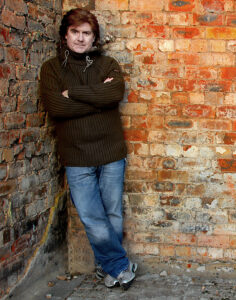 Joining 2020’s inductees to the Scots Trad Music Awards Hall of Fame is piper Fred Morrison. With a background in the piping traditions of South Uist, he has gone on to push the boundaries of his instrument, helping to shape its evolution – from the competition circuit to the folk scene.
Joining 2020’s inductees to the Scots Trad Music Awards Hall of Fame is piper Fred Morrison. With a background in the piping traditions of South Uist, he has gone on to push the boundaries of his instrument, helping to shape its evolution – from the competition circuit to the folk scene.
Morrison’s father, Fred Morrison Snr was a schoolmaster who left South Uist to study in Glasgow, before taking up a teaching post in Aberdeen. He took up the post as much to develop his fanatical interest in pibroch as his career; living and working in Aberdeen provided Morrison Snr the opportunity to study with Robert Brown and Robert Nicol – the Bobs of Balmoral – leading experts in Ceòl Mòr. Morrison Snr would also research and learn as much as he could about this music. When he played, the influence of Gaelic was clear to see, something also the case in Morrison’s own playing.
By the time Morrison was born, the family had moved to Bishopton. Having always been surrounded by pipe music. It wasn’t long before he himself started learning to play. His first teacher was Pipe Major Norman Gillies, who at the time was teaching a Saturday class in Paisley. These lessons, along with help and guidance from his father’s piping acquaintances, top flight pipers and teachers themselves, meant it wasn’t long before he started seeing results on the competition circuit.
The height of Morrison’s competitive success came with winning the Highland Society of London’s Gold Medal at both the Argyllshire Gathering (1986), and the Northern Meeting (1991). The prizes are among the most prestigious a solo piper can receive, to win both is a sign of a player at the top of their game. Morrison holds an equally notable competitive record in the Festival Interceltique de Lorient’s MacCrimmon trophy. He first won the prize in 1984, and as of 2019 had come out in top position a record ten times!
At the same time, interests in the world of folk music were bubbling away in the background. In his youth, Morrison took as much influence from groups like The Bothy Band and The Tannahill Weavers as he did the solo piping style by which he was surrounded. He went on to become a multi-instrumentalist, taking up whistle and border pipes.
In 1993 – two years after his win at Inverness, Morrison was invited to join Dick Gaughan’s folk-supergroup Clan Alba, the beginning of his continuing successes in the folk music scene. Soon after, he joined Capercaillie for three years. Over his time with the band, Morrison was involved in the band’s contribution to the soundtrack of Michael Caton-Jones’ 1995 film Rob Roy.
In recent years, Morrison has become most well known through his work as a solo artist. He tours solo and with his own trio, with five solo albums to his name. His work on this front showcases his abilities as a composer too. This month (December 2020), marks the release of the second volume of The Fred Morrison Collection – a selection of original tunes popular on both the solo piping circuit and the folk scene.
In this solo work, a broad range of influences have become apparent in Morrison’s music, including: Country, bluegrass and the traditional music of Galicia, Brittany and Ireland – he is also a master of the Uilleann Pipes. Skill and versatility which saw him awarded Instrumentalist of the Year at the 2004 Scots Trad Music Awards.
Morrison has turned his hand to large scale works too. In 2005, came the premiere of Paracas: Rhapsody of the Gael. Written with composer Mark Sheridan, the hour-and-a-half long piece was first performed at the opening concert of Glasgow’s Celtic Connections Festival by a cast of over a hundred musicians.
The Herald once described Morrison as “A piper of the world”, and it’s certainly a fitting description. His virtuosity and instrumental skill are matched by few, and his broad musical approach has played a big part in the development of the piping in folk music.